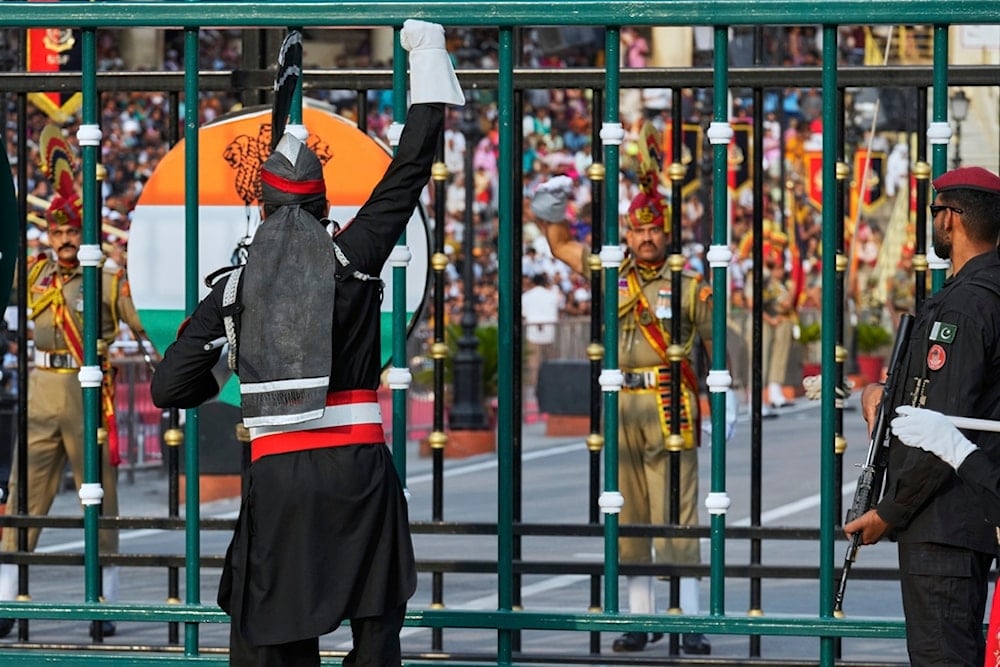UNSC to discuss rising tensions in Kashmir at Pakistan's request
The UN Security Council will hold closed consultations after Pakistan requested a meeting on India-Pakistan tensions following the deadly Pahalgam attack last month.
-

Pakistan's Rangers soldier, in black, and Indian Border Security Forces soldier gesture to each other during a daily closing ceremony at the Wagah, a joint post on the Pakistan and India border, near Lahore, Pakistan, Saturday, May 3, 2025. (AP)
The UN Security Council will convene for closed consultations on Monday to discuss rising tensions between India and Pakistan, following the latter's formal request for an emergency meeting, the Press Trust of India reported.
The move comes in the wake of the deadly April 22 Pahalgam attack, which killed 26 civilians in the resort town of Pahalgam in Indian-administered Kashmir.
Pakistan, currently a non-permanent member of the 15-nation Security Council, requested the session, which was confirmed and scheduled by Greece, the Council's rotating president for May.
Greece confirms meeting
Evangelos Sekeris, Permanent Representative of Greece to the United Nations and current Security Council President, stated that consultations were appropriate under the circumstances.
“Maybe it's also an opportunity to have views expressed and this might help to diffuse a bit of tension,” he noted.
The Council currently includes five permanent members, China, France, Russia, the UK, and the US, and ten non-permanent members: Algeria, Denmark, Greece, Guyana, Pakistan, Panama, South Korea, Sierra Leone, Slovenia, and Somalia.
India engages with UN members over Pahalgam attack
The Pahalgam attack has sharply escalated tensions between the nuclear-armed neighbors. India has accused Pakistan of backing cross-border terrorism and has vowed to bring those responsible to justice.
India's External Affairs Minister Subrahmanyam Jaishankar has spoken with nearly all Security Council members, except China and Pakistan, stressing that “its perpetrators, backers and planners must be brought to justice.”
He also held a “good conversation” with Greek Foreign Minister George Gerapetritis, discussing both the attack and regional stability.
Jaishankar welcomed Greece’s stance against cross-border terrorism and emphasized the strength of the bilateral Strategic Partnership.
Pakistan cites Kashmir context in UN push
At a press conference last Friday, Pakistan’s Permanent Representative to the UN, Ambassador Asim Iftikhar Ahmad, defended Islamabad’s call for the meeting, stating, “We see that all of this that is happening is in the context, in the backdrop of the situation in Jammu and Kashmir.”
Ahmad added, “The situation... is a real threat to regional and international peace and security,” arguing that the Security Council has both the mandate and legitimacy to address the issue.
He emphasized that Pakistan had consulted with both last month’s and this month’s Council presidencies and reserved the right to convene discussions “when we feel appropriate.”
The ambassador also met with UN Secretary-General Antonio Guterres last week to brief him on the regional security situation.
Pakistan conducts missile launch amid rising tensions with India
Pakistan’s military announced on Saturday it had conducted a “successful training launch” of the Abdali Weapon System, a surface-to-surface missile with a range of 450 kilometers, further intensifying the Pakistan-India tensions after last month’s deadly attack in Pahalgam.
According to a military statement, the launch was intended to ensure "the operational readiness of troops” and validate key features of the system, including its advanced navigation and enhanced maneuverability. The location of the test was not disclosed.
The missile launch follows the April attack in Pahalgam. New Delhi has blamed Islamabad for supporting the attackers, prompting Indian Prime Minister Narendra Modi to declare that he has given his military "full operational freedom" to respond.
Islamabad, in turn, has denied any involvement in the Pahalgam attack, calling for an independent investigation and warning of potential retaliatory measures if aggression from India occurs.
In the wake of Modi’s statements, Pakistan issued warnings about an imminent air strike from India and reiterated its readiness to respond with force. On Friday, Pakistan’s Chief of Army Staff General Syed Asim Munir chaired a high-level meeting with senior commanders to assess the “current Pakistan-India standoff.”
The military leadership, according to an official statement, stressed the importance of “heightened vigilance and proactive readiness across all fronts.”
Clashes along Line of Control continue
The de facto border Line of Control clashes have escalated since the Pahalgam attack, with Indian defense sources reporting nine consecutive nights of gunfire across the militarised de facto border.
Diplomatic relations between the two countries have deteriorated further, with tit-for-tat expulsions and the closure of several border crossings.
The latest escalation has drawn international concern. China has urged both sides to exercise “restraint", while the European Union has described the situation as “alarming".
In an interview for Fox News, US Vice President JD Vance called on India to act in a manner “that doesn't lead to a broader regional conflict.” He also pressed Pakistan to take action against militants allegedly operating from its territory.
The conflict in Kashmir, a Muslim-majority region claimed in full by both countries, remains at the heart of tensions. Rebels in Indian-administered Kashmir have waged an armed insurgency since 1989, demanding either independence or unification with Pakistan.
India continues to accuse Pakistan of backing the insurgents, an allegation that Islamabad denies. Pakistan says it supports the people of Kashmir in their right to self-determination and frequently condemns alleged human rights violations committed by Indian forces in the region.
Read more: Russia offers to mediate Kashmir tensions

 5 Min Read
5 Min Read








